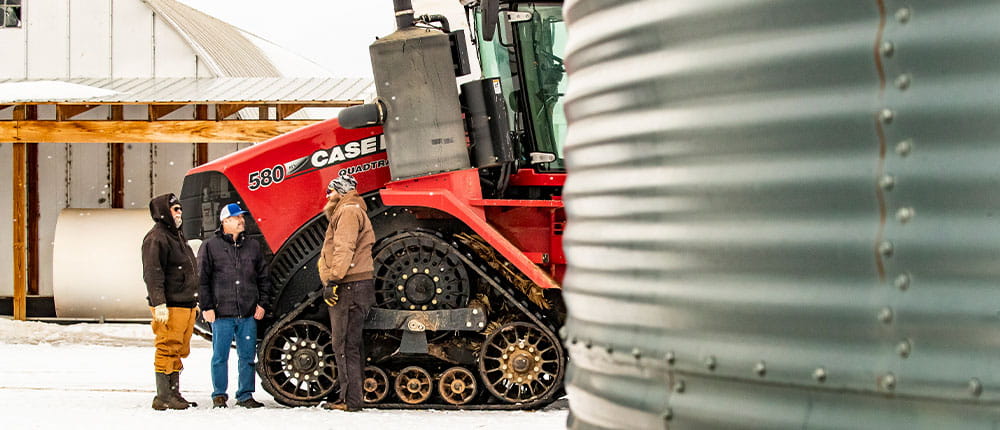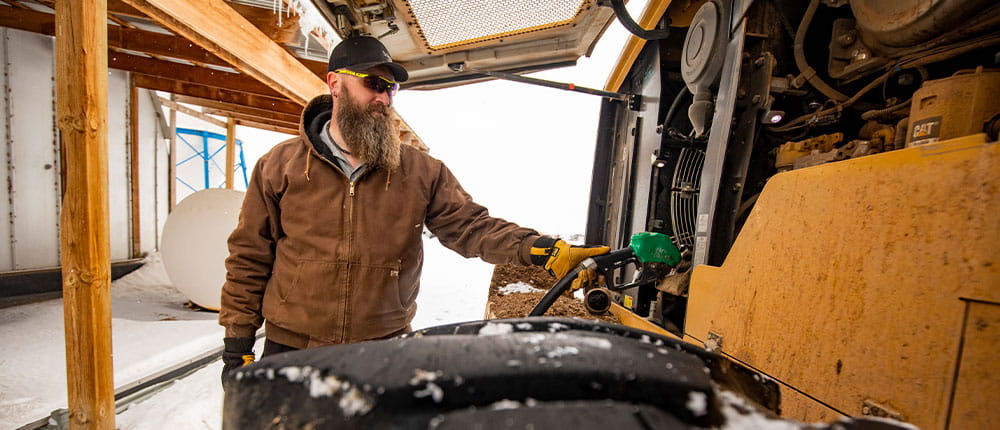The old milkhouse and sprawling fields are still there but make no mistake: The Ridl operation you’ll find in Dickinson, N.D., today looks much different than it did a century ago — and for good reason.
The Ridl family doesn’t shy away from change.
What began as a small dairy and hog farm in the late 1920s has transformed into a diverse crop and cattle operation spanning 10,000 acres. A future-focused approach is key to the operation’s longstanding success.
“With how quickly our world and our industry is changing, you won’t be in business long if you’re afraid to adapt,” says Art Ridl, a third-generation producer who took the helm of the family operation with his brother, Kurt, in the 1980s. “My dad and grandfather built a solid foundation for our operation, but the changes we’ve made along the way are helping us grow today.”
These days, you’ll find Holstein steers and nearly 250 registered Angus cows where dairy cattle once grazed. Acres of flax, oats, canola, soybeans and crambe have been replaced by spring wheat, malt barley, corn, sunflowers and hay.
When his sons, Joe and Rusty, were old enough to help run the operation, Ridl tapped the technical expertise of the next generation to bring data-driven solutions to the operation, from high-performance seed to the DNA profiles provided with each bull sold.
“We’re always experimenting and trying new things to stay a few steps ahead,” he says. “We have to stay proactive to make sure we’re finding opportunities that will keep us moving forward.”
Staying on track with Cenex premium diesel
One thing hasn’t changed: The Ridls’ dependence on Cenex® premium diesel fuel to keep their operation humming.
“We’ve used Cenex premium diesel as far back as I can remember,” says Ridl, but he’s quick to note that history doesn’t drive his purchase decisions. For Ridl, performance is paramount.
EPA emission standards: then and now
Creation of EPA emissions standards in the 20th century spurred advancements in engine technology and the fuel that powers it.
1994-1997
Tier I: The first federal standards for new off-road diesel engines are adopted in 1994 and phased in from 1996 to 2000.
2000-2008
Tier II regulations restrict sulfur in refined fuels.
Tier III regulations set new tailpipe and evaporative emission standards beginning with 2017 vehicles, plus new fuel standards.
2008-2015
Tier IV standards require emissions of particulate matter (PM) and nitrous oxide (NOx) to be reduced by about 90% using technology like advanced exhaust gas aftertreatment systems.
2021
The California Air Resources Board holds its first public workshop on Tier V emission standards to further reduce PM and NOx emissions by an additional 50 to 90% by 2028-2030.
Late 2022
EPA established a final rule for Tier V emission standards to further reduce air pollution from heavy-duty vehicles and engines, effective with 2027 model year engines.
“We can’t keep our operation on track without equipment that’s ready to go, and when it comes time to perform, Cenex premium diesel never lets us down,” he says. “When you see consistent performance day in and day out without hiccups, that speaks volumes. That’s the quality I need.”
Ridl uses Cenex Roadmaster XL® premium diesel fuel to power his truck fleet and Cenex Ruby Fieldmaster® premium diesel to run his tractors, payloaders, skid-steer loader and forage grinder-mixer. In cold weather, he counts on Cenex Wintermaster® premium diesel to keep equipment moving.
Joe Ridl is a trained mechanic and can easily spot a problematic product when it comes time for a tune-up, his dad says. They see return on their fuel investment firsthand when it comes to maintenance.
“We’re always open to trying something new if it could be a benefit, but we love how these fuels stand up to dirt and combat normal wear and tear,” Ridl says. “It pays off for us in the field and in maintenance we don’t have to worry about.”
Innovations in engine technology
Like the Ridls, the technical experts behind their go-to Cenex premium diesel fuels are no strangers to innovation.
As farming operations work to keep pace with technologies, policies and advances shaping the future of ag, Cenex brand experts are evolving premium diesel fuels to meet the needs of producers today and fuel the farms of the future.
Last fall, after more than 14 months of research, development, testing and analysis, the CHS energy team released the next generation of Cenex premium diesel fuels. The enhanced formula includes an additive package engineered not only to boost power, performance and engine protection in on-road and off-road equipment, but also to anticipate and meet the challenges of future engine technology.
“It’s been 10 years since we updated our comprehensive additive package,” says Erin Wroge, senior product manager for refined fuels at CHS. “In that time, we’ve seen an evolution in diesel engine technology to meet the changing standards designed to provide better fuel economy and reduce emissions.”
Since the previous generation of Cenex premium diesel fuel was launched in 2012, the U.S. Environmental Protection Agency (EPA) rolled out Tier IV emission standards, and engine technology adapted to follow suit. Policy discussions to implement newly released Tier V standards are already underway. The updated Cenex premium diesel formula was designed with stricter emission regulations in mind to ensure users are prepared when those new standards come into play.
“This is a chance to get out ahead of what’s coming down the pike within the industry and to build on the superior performance Cenex premium diesel provides,” says Wroge. “We know a major focus will be lowering emissions and we proactively planned for that in this updated formula, but we’ve also taken the opportunity to increase fuel efficiency, enhance performance and help users get the most out of their equipment and fuel investments.”

Designed to deliver
The optimized formula features four key enhancements, including,
- an advanced aggressive detergency package for better overall engine health and a cleaner environment for efficient consumption
- a two-phase total water management system to keep water and contaminants out of storage tanks and fueling systems
- maximum filterability and improved biostability
- a balanced, complete fuel burn for excellent fuel economy
With these enhancements working together, ultra-clean injectors and cylinders make better use of fuel, putting less strain on the exhaust aftertreatment system and requiring fewer regenerations. When fuel stays clean, it flows efficiently through all components for more balanced combustion and reduced downtime.
“The success of our customers is the heartbeat of everything we do,” says Wroge. “Equipment doesn’t do them any good if it’s not up and running. This enhanced formula arms customers with the protection, power and precision they need for the tough jobs they carry out each day, keeping them off the sidelines and on the move.”
Enhanced fuel formula helps minimize downtime
The newly enhanced formulas of Cenex Roadmaster XL® and Cenex® Ruby Fieldmaster® premium diesel fuels feature nine comprehensive benefits to keep engines running cleaner, longer and stronger. Here’s how:
- Advanced, aggressive detergency package breaks down harmful engine deposits, cleans up and removes injector deposits, and boosts fuel economy.
- Two-phase total water management system separates water from fuel, allowing gravity to pull water to tank bottoms for easy drainage, then encapsulates remaining negligible water for safe passage.
- Maximum filterability and enhanced biostability protects equipment from contaminants to extend fuel storage life, reduce fuel degradation, keep fuel injectors and pumps clear, and maximize fuel efficiency.
- Reduced exhaust cylinder temperature deviations optimizes fuel burn evenly across all cylinders for complete combustion, which produces less soot, extends engine life, leads to fewer regenerations and minimizes wear and tear on the exhaust aftertreatment system.
- Injection and combustion optimization prevents coking and internal diesel injector deposits, while reducing filter and injector repairs and replacement.
- Storage stability reduces gum and varnish buildup and preserves fuel integrity to optimize combustibility.
- Corrosion protection prevents rust, corrosion and corrosion-caused leaks, while slowing natural diesel fuel degradation from oxygen exposure.
- Improved lubricity provides 10-15% more lubricity and protects injectors and fuel pumps from wear.
- High cetane number improves cold weather starts, generates fewer emissions and fewer regenerations, and reduces wear and tear on the exhaust after-treatment system.




